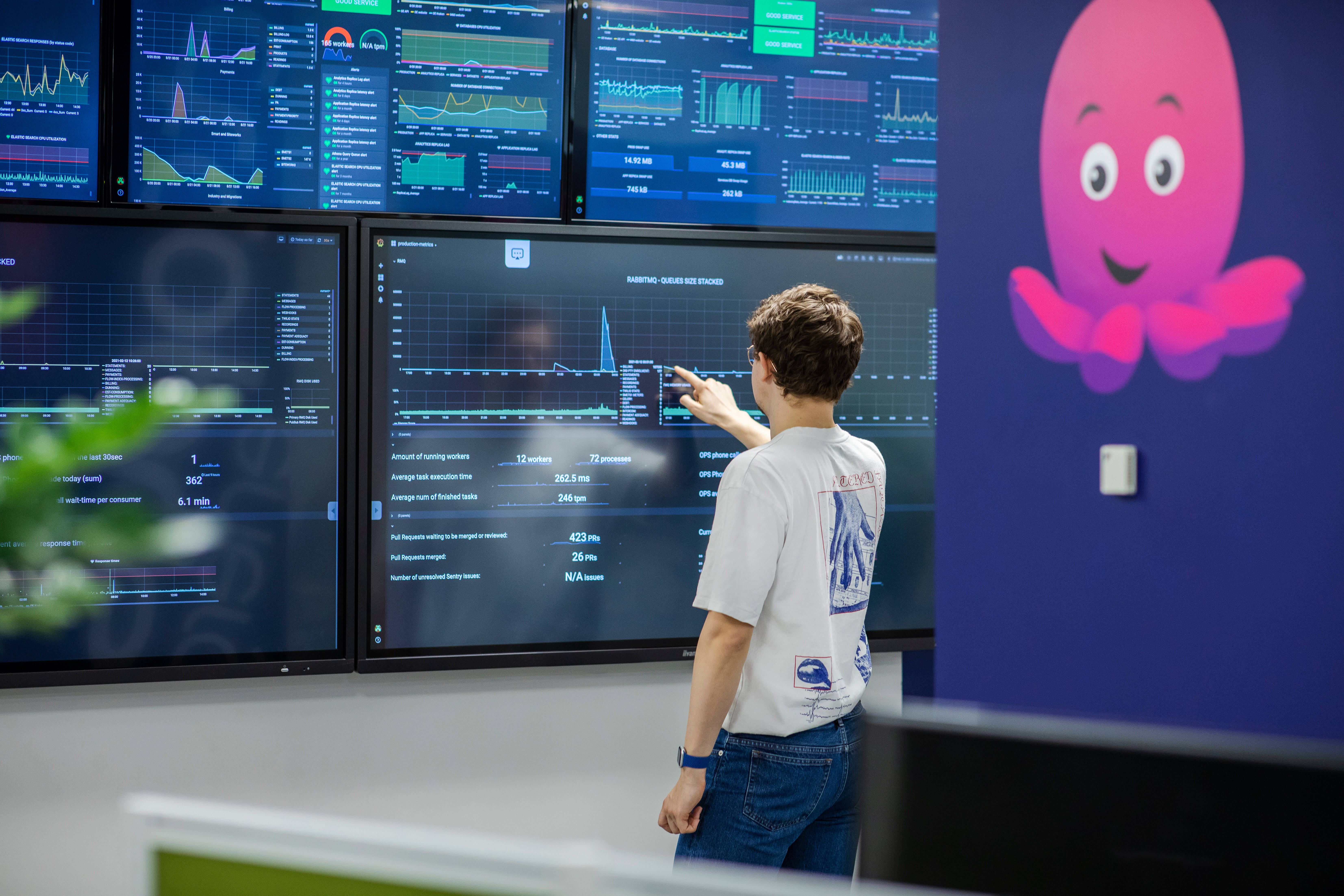You’ve reached your limit!
To continue enjoying Utility Week Innovate, brought to you in association with Utility Week Live or gain unlimited Utility Week site access choose the option that applies to you below:
Register to access Utility Week Innovate
- Get the latest insight on frontline business challenges
- Receive specialist sector newsletters to keep you informed
- Access our Utility Week Innovate content for free
- Join us in bringing collaborative innovation to life at Utility Week Live

Tara Mullen, Octopus Energy’s director of operations, explains how the retailer is innovating around staff skills, technology and empowering consumers in preparation for financial headwinds forecast this winter.
Octopus Energy adapted either its tech offering, staff working patterns, or customer communication channels every day during the four weeks preceding Utility Week’s Consumer Debt and Vulnerability Conference according to director of operations, Tara Mullen.
 And she added that while the government’s recent support package has provided some relief, this winter will no doubt be punctuated by the most significant cost of living challenges for a generation.
And she added that while the government’s recent support package has provided some relief, this winter will no doubt be punctuated by the most significant cost of living challenges for a generation.
In preparation, she told delegates that Octopus has spent the summer months updating its systems to streamline customer access to support and is taking heart from what she describes as a “disruptive” period in terms of innovation.
“Hopefully we can do a lot more for customers and can speed up the digitalising of some of our interventions so that we can make it quick and easy for customers to make decisions around their energy uses,” she explained.
“I think the main thing is that we focus on what we can control. What actions we can take from a practical intervention perspective, use technology as much as possible to provide accessibility and stay as close to the customer as we possibly can in every role.”
Data and technology drive
 Mullen, who has been at Octopus for two years having previously worked for Tesla, explained that technology is the biggest way that she believes utilities can support customers during the cost of living crisis.
Mullen, who has been at Octopus for two years having previously worked for Tesla, explained that technology is the biggest way that she believes utilities can support customers during the cost of living crisis.
She said that the firm’s approach is underpinned by its Kraken platform – which provides services such as billing, payment, meter data, digital self-service and telephony in one place. This allows energy specialists to both quickly access swathes of customer data and carry out “health checks” which inform staff of any issues a customer may be facing, their PSR status and any vulnerabilities.

- Resilience, reliability and collaborative transformation to adopt technology and innovation are among the key themes at the Utility Week Forum, which will take place in London on 8-9 November. Find out more here.
Broadening skill sets
However beyond this, Mullen told delegates that Octopus has worked to deepen its pool of expertise through a number of initiatives to upskill staff at all levels – for example, by offering Suicide First Aid training. “At least three or four people in every team are trained to speak to customers in that situation,” she said.
“I think the scale of the issue now is such that almost every one of our team has to have the ability to support everybody,” Mullen added. “We treat all customers as if they have as if they could become vulnerable”.
As part of this focus, she explained that Octopus has trained “universal energy specialists” – staff members skilled in all areas of customer service – and provided them with affordability training in order for them to take on more conversations regarding financial difficulty.

“That means that we’ve been able to adapt our team quickly and move from maybe 30 people supporting customers with processes to 1,000 energy specialists being able to work with customers.”
Octopus also successfully trialed the introduction of “energy helpers” during the summer and has pledged they will make 500,000 visits to customers seeking face-to-face support this winter. “Prior to the crisis a lot of focus was on growth and a number of our brand ambassadors were doing face to face promotion of Octopus Energy Services,” Mullen explained. “They’ve now been retrained and are supporting customers in the home with energy advice.”
Combined with the day-to-day input of senior staff including CEO Greg Jackson, Mullen believes that Octopus’ collective knowledge and recently expanded skill set has helped the firm and its customers respond to market forces and new information from the government alike.
“I think in a period where communication has been difficult and there’s been a lot of uncertainty, being able to adapt has been powerful and I think has helped customers have a better understanding of what’s happening around them,” she said.
Innovating for customer control
While empowering its staff to withstand challenges brought about by the cost of living crisis, Mullen added that Octopus has also deployed new tools such as a financial support kit to enable customers to “control what they can control”.
“Often it can feel like you’ve got no control and that there are these huge market forces preventing us from taking action,” she explained. “But I think every action that we take, as long as it’s helping customers both with and without vulnerabilities to access information, is going to help them save on their energy.”
Consequently, the energy retailer has increased investment in its Octo Assist Fund – launched to help those worried about paying energy bills this winter – from around £5 million to £15 million, and capitalised on opportunities to work with partners, such as its referral of 1,500 customers to financial services firm Reach Out.
 Octopus has also provided in the region of 7,000, free electric blankets to customers, a move which has enabled them to save some 16% on their energy costs and will continue throughout winter. What’s more, the firm’s Winter Workout initiative – offering a series tips to cut gas use and tracked progress against personalised 12-week targets – has involved some 250,000 and yielded energy savings of around 12%.
Octopus has also provided in the region of 7,000, free electric blankets to customers, a move which has enabled them to save some 16% on their energy costs and will continue throughout winter. What’s more, the firm’s Winter Workout initiative – offering a series tips to cut gas use and tracked progress against personalised 12-week targets – has involved some 250,000 and yielded energy savings of around 12%.
Streamlined communication
In an effort to ensure that its financial comms and energy bills are as clear as possible, Octopus has also partnered with the Plain Numbers campaign.
According to Plain Numbers, roughly half of working age adults have the numeracy level of a primary school child – yet few products or services are geared accordingly. As such, firms such as Octopus are using behavioural science research to simplify the way they talk to their customers about numbers.
 “We found that we doubled understanding of energy bills by working with Plain Numbers,” Mullen said.
“We found that we doubled understanding of energy bills by working with Plain Numbers,” Mullen said.
The partnership has also inspired Octopus to reassess its broader comms and ensure that the complexities of the cost of living crisis are being similarly streamlined.
“Greg has communicated at least three times to our entire customer base, giving them information about what’s driving this energy crisis, how it works, how will it impact them, and the kinds of things customers could be thinking about – and also describing quite complex macro situations like the how the market works from a wholesale pricing perspective,” Mullen explained. “I think most customers now have a better understanding of how energy works and what some of the challenges are.”
She added that Octopus’ drive for simplicity has also seen it pare back its website, app and email communications, and focus on a more intimate approach to customer calls. “We don’t have chat bots,” she said. “Each of our teams has its own customer base, so when a customer calls through, they go through to the same set of 12 people to build an intimacy and relationship over time.”
 Utility Week Innovate, in collaboration with Utility Week Live aims to discover and promote innovative approaches to tackle front line business challenges through case studies, technical/project studies, networking, and live content. Be recognised as a key solution provider and meet your target audience face-to-face at UWL23. Find out more about exhibiting
Utility Week Innovate, in collaboration with Utility Week Live aims to discover and promote innovative approaches to tackle front line business challenges through case studies, technical/project studies, networking, and live content. Be recognised as a key solution provider and meet your target audience face-to-face at UWL23. Find out more about exhibiting
Please login or Register to leave a comment.